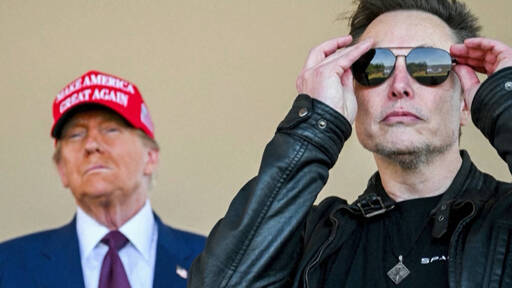Billionaire Trump associate Elon Musk’s latest disinformation campaign is targeting the U.K. government, which Musk appears to believe is not sufficiently anti-immigrant. Musk, who has already shaped the incoming Trump administration’s economic policy by proposing cuts to government spending and tech-oriented privatization of services, signifies a “new era” in American politics, says our guest Quinn Slobodian, who is chronicling right-wing tech billionaires’ accelerating attempts to mold the world according to their “destructive” and “nihilist” beliefs. In a far-reaching conversation, Slobodian touches on Musk’s clear admiration of authoritarian strongmen, market deregulation and white supremacist rhetoric.
…
For more, we spend the rest of the hour with a person who’s documented the power of Big Tech billionaires and the new techs, specifically, among others, Elon Musk, the richest man in the world. Quinn Slobodian is professor of international history at Boston University. His latest book is Crack-Up Capitalism: Market Radicals and the Dream of a World Without Democracy. He’s written several pieces for The New Statesman on Elon Musk, including one headlined “Elon Musk’s death drive.” Slobodian also recently contributed to The New York Review of Books running symposium about the reelection of Donald Trump, “The Return of Trump—II.”
…
QUINN SLOBODIAN: Yeah, it’s a pretty extraordinary situation to find ourselves in, right? I mean, if you think back to 2017, there was a lot of concern and attention to the efforts of Steve Bannon to create a kind of transatlantic coalition of far-right actors and parties. Imagine now here we are only a few years later, and there’s a Bannon-like figure but who also happens to be the wealthiest man in the world, overseeing some of the most profitable companies in the planet, who is leading that sort of effort to create a transatlantic coalition. So, the stakes are much, much higher. They are being dealt with with perhaps even less kind of care than someone like Bannon, which is an extraordinary thing to say. But Musk, I think, has entered this field of politics as a kind of scaled-up version of his video game play, with no real thought to the kind of consequences of the disruptive effects that he’s creating, from here to Britain to Germany and beyond.
…
And I think that, you know, the kind of — the horizon of what the kind of politics in real life that someone like Musk is aiming at is broadcast by him frequently on his own Twitter account. Most recently, for example, he celebrated Nayib Bukele, the leader in El Salvador, as having done something that has happened in El Salvador and will happen and must happen in the United States, which, in El Salvador, has been to imprison 2% of the adult population as an absolutely draconian way of cracking down on crime. So, this vision of sort of authoritarian strongman on politics, sort of gloves-off mass incarceration crackdowns, on the one hand, and then a deregulatory kind of unleashing of the free market, on the other hand, is — produced this kind of curious combination of, on the one hand, Elon Musk posting Milton Friedman memes all the time, on the other hand, scaremongering about the, quote-unquote, “genocidal rape tactics” of nonwhite immigrants in the U.K. So, he’s produced this sort of surreal effect, I think, of sort of the strong state and the free market turning the sort of Thatcherist vision, grafting it onto all kinds of online aesthetics and kind of video game dynamics in ways that have really, I think, blindsided, for good reason, sort of mainstream, normal politicians, like Olaf Scholz, Keir Starmer, Biden-Harris, who don’t know how to deal with this kind of chaotic energy, which, unfortunately, has a huge amount of legitimacy behind it, not only his multimillion-dollar — or, multimillion number of followers on social media.
…
AMY GOODMAN: Let me ask you something. I’m looking at a piece in the Financial Times. “Elon Musk lived in apartheid South Africa until he was 17. David Sacks, the venture capitalist who has become a fundraiser for Donald Trump and a troll [of] Ukraine, left aged five, and grew up in a South African diaspora family in Tennessee. Peter Thiel spent years of childhood in South Africa and Namibia, where his father was involved in uranium mining as part of the apartheid regime’s clandestine drive to acquire nuclear weapons. And Paul Furber, an obscure South African software developer and tech journalist living near Johannesburg, has been identified by two teams of forensic linguists as the originator of the QAnon conspiracy, which helped shape Trump’s Maga movement. (Furber denies being ‘Q’.) In short, four of Maga’s most influential voices are fiftysomething white men with formative experiences in apartheid South Africa.”



Not coincidental at all, apparently.
Here is the archived version of that FT article, which includes: